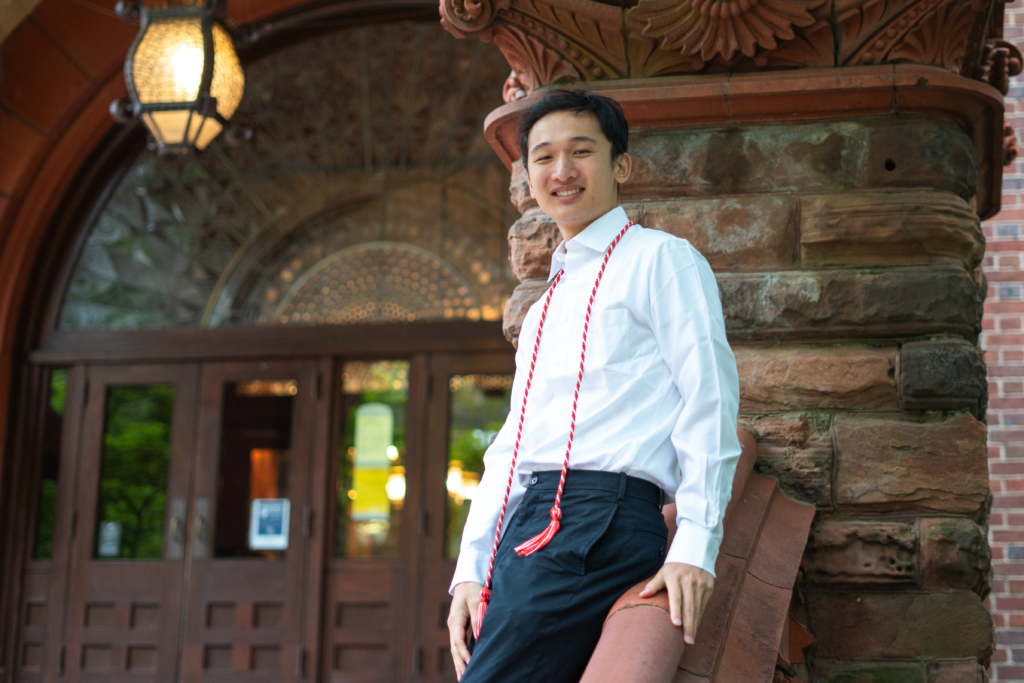Four students from the University of Pennsylvania have been awarded the prestigious NSF Graduate Research Fellowship Program (GRFP) for 2024. Three of these awardees, Lena Armstrong, Emmanuel Suarez Acevedo, and Stephan Xie, will be heading to other universities for their PhDs, while Edward Zhang will continue his doctoral studies at Penn. Here are their achievements and reflections on this milestone.
Lena Armstrong (HCI)

Lena Armstrong, who works with Danaë Metaxa, will begin her PhD in Computer Science at Harvard this fall. Reflecting on her achievement, Armstrong said, “I feel excited and honored to have received the NSF Graduate Research Fellowship. This award allows me greater access to resources and opportunities to further my research, advocacy, and teaching goals. My aim is to change the narrative of who gets to shape our digital future and create more inclusive experiences in computer science.”
Armstrong’s research focuses on algorithmic fairness, particularly in employment and housing. She has co-authored several papers, including “Navigating a Black Box: Students’ Experiences and Perceptions of Automated Hiring” and “The Silicon Ceiling: Auditing GPT’s Race and Gender Bias in Hiring.”
Danaë Metaxa praised Armstrong, stating, “Lena is a star, one of the most motivated and creative undergraduates I have worked with. Her departure is bittersweet, but I look forward to seeing all she will accomplish at Harvard.”
Emmanuel Suarez Acevedo (Formal Methods, Verification, and Programming Languages)

Emmanuel Suarez Acevedo, advised by Stephanie Weirich, is heading to Cornell for his PhD. On receiving the fellowship, Acevedo remarked, “I was excited and grateful for the support from fellow students and professors at Penn. The GRFP will allow me to focus on my dissertation topic without the worry of finding funding, enabling me to continue working towards broadening participation in computer science.”
Acevedo recently worked on an extension to an intermediate language for static tracking of program behaviors, collaborating with students from Penn and the University of Michigan. This work aims to improve compiler optimizations.
Stephanie Weirich commented, “Emma is heading to Cornell’s PhD program next year and will intern with Kuen-Bang Hou Favonia at the University of Minnesota this summer. He has worked with me on several projects, including enhancing the Call-by-Push-Value type system and mechanizing proofs in Agda.”
Stephan Xie (Machine Learning)

Stephan Xie, who has been working with Aaron Roth, will pursue his PhD in Machine Learning at Carnegie Mellon University. Xie shared his excitement, saying, “Receiving the GRFP was a huge honor. It gives me more confidence in my research direction and opens up many possibilities as I begin my PhD.”
Xie’s research focuses on advancing machine learning decision-making and discovery in real-world applications. He has worked on projects exploring unbiased predictions and improving the reliability of deep learning.

Aaron Roth expressed his enthusiasm for Xie’s work, stating, “It was great fun working with Stephan. Together with my PhD students, we wrote what turned out to be my favorite paper in some time. I’m looking forward to following his progress at CMU.”
Edward Zhang (Computer Vision)

Edward Zhang, who will continue his PhD at Penn, expressed his gratitude for receiving the fellowship. “I am incredibly grateful and honored to have received this opportunity. I hope to leverage these funds to take charge of my own research direction,” Zhang said.
Zhang plans to use the funding to investigate the use of visual computing to solve real-world problems in disciplines like medicine, public health, and public policy. He aims to deploy these solutions in economically sustainable and scalable ways.

Congratulations to all the 2024 NSF GRFP awardees! This is a well-deserved achievement, and we look forward to seeing the remarkable contributions you will make during your PhDs!